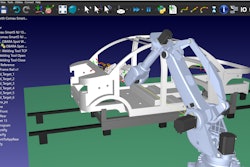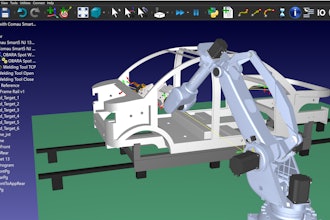
Technology is changing the way the manufacturing industry operates. With encryption capabilities in cloud computing, a more robust Industrial Internet of Things (IIoT), and access to private 5G networks, manufacturing systems are becoming more efficient across the board. Advanced quality control systems are helping manufacturers produce better-quality products. Predictive machine maintenance systems give alerts when parts need replacing before the machine breaks down, saving money on time lost due to unexpected shutdowns. And streamlined communication channels make collaboration more effective and consistent regardless of where teams are located.
Each year the market sees the launch of new SaaS systems to match the expanding possibilities and scalability of the cloud. These software systems enable companies to coordinate and manage every aspect of manufacturing with increased transparency, efficiency, and agility. These three factors are vital for organizations to stay competitive.
Which aspects of manufacturing need SaaS systems the most? Let's look at the top five categories of SaaS systems that leading manufacturers use.
1. CRM Software
Consumers are the reason why manufacturers make the products that they do. Managing and maintaining those relationships with loyal customers is a top priority now, as it always has been. While the paper Rolodex may be long gone, the concept of collecting and organizing valuable customer information persists; only now, digital tools are used to foster customer relationships.
Customer Relationship Management (CRM) platforms help manufacturers stay in contact with their buyers and their direct-to-consumer markets. A CRM platform can do everything from keeping contact information, tracking buying patterns, collecting feedback, and coordinating marketing campaigns. With encrypted cloud servers used by most CRM platforms, the sensitive data of customers remain safe and secure, which helps build and maintain the trust factor for manufacturers.
Monday Sales CRM has been known to have a customizable platform that easily integrates with other SaaS products, making it easier for manufacturers to manage customer relationships.
2. Project Management Software
Manufacturing consists of ongoing projects. While some are just starting, others are ending, and others are somewhere in the middle of the process. Not only are there numerous projects in motion, but there are also many different project managers overseeing these projects. It's critical to keep information out of silos and into platforms where effective sharing and collaboration can happen.
Project management software helps keep project managers on top of their workloads while running in multiple different directions. One software for all projects helps management teams better manage their timelines, delegate the right tasks, manage project costs, and re-evaluate necessary adjustments to project schedules.
Workzone has been known to have a robust customer success team that helps with complex projects, ideal for manufacturers with complex systems.
3. Quality Management Software
The leading manufacturers in the world are known for quality products and command high customer brand loyalty, but this loyalty doesn't guarantee that they will remain steadfast. Customers expect a certain level of quality, and once they have a great experience and fall in love with a product, they want to replicate that experience over and over again. Fail to meet those expectations, and customers will seek out competitors.
Managing the quality of products, services, and customer experience requires meticulous management of data, qualitative feedback, and processes. Quality Management Software (QMS) helps companies manage this data, such as collecting customer feedback, tracking customer satisfaction, and analyzing product or service performance. With the data generated from QMS systems, companies can continually seek to improve their products or services to lead in the market.
The ISO 9000 family of QMS has been known to set standards that help manufacturers meet customer and stakeholder needs within statutory and regulatory requirements for their products.
4. Roadmap Management Software
In manufacturing, products aren't made unless a roadmap is in place. Roadmaps are invaluable tools for product development, software development, product launches, and even finance. Without roadmaps, product plans can miss important details, increase manufacturing costs, or get over complicated and completely misalign with the company's goals.
What most manufacturers can benefit from is having a tool that helps them better manage their roadmaps. Product Roadmap Management (PRM) software helps manufacturers monitor, analyze, and better manage all of their roadmaps in one location, creating greater transparency across the organization. PRM software also helps companies have greater alignment with their goals and the agility to change directions and make product decisions faster based on accurate data.
Gocious PRM software has been known to help manufacturers increase their agility with a single source of truth that creates transparency across their product portfolios.
5. ERP System
Aside from managing specific portions of the business, manufacturers also need overarching software to manage the organization's day-to-day operations. This type of software is known as an Enterprise Resource Planning system or ERP system. Having an ERP system allows manufacturers to have one go-to place to check in on all departments at a high level, including finance, procurement, human resources, distribution, customer relationship management, product management, and more.
The right ERP system allows management teams to work more productively while requiring fewer resources. When considering which ERP system is suitable, it's best to look for one that can improve workflow continuity in all areas and integrates with other SaaS systems to increase efficiency and facilitate collaborative communication.
Oracle Fusion Cloud ERP has been known for its advanced capabilities that help manufacturers stay current and gain a competitive advantage through AI, automation, and automatic updates.
SaaS Systems Create Efficiencies in All Departments
A manufacturer may have dozens of managers in different roles across their organization, depending on the size of the company. Using SaaS systems to manage information, communication, and people makes it easier for managers to do their work well. Combining technology with SaaS systems can reduce operating costs, improve transparency between divisions, and help companies be more agile overall. The more manufacturers embrace technology and software in their operations, the better they will be prepared for each new wave of innovation.
Choosing the Right SaaS for Your Company
All of the SaaS systems mentioned in this article focus on the same three common themes: increased transparency, improved agility, and the creation of one single source of truth. If manufacturers want to see improvements in all three of these areas, they'll need to begin by implementing various combinations of SaaS systems across their organization. Without them, it will be difficult to maintain a competitive edge.























